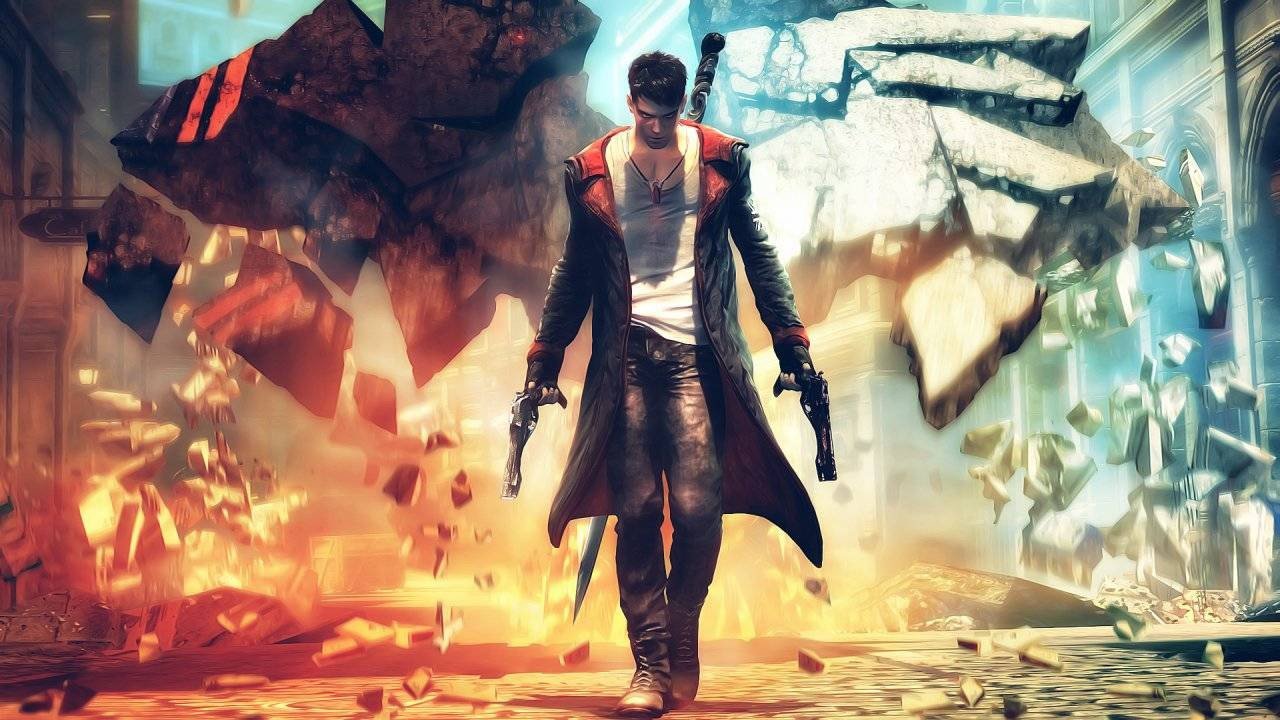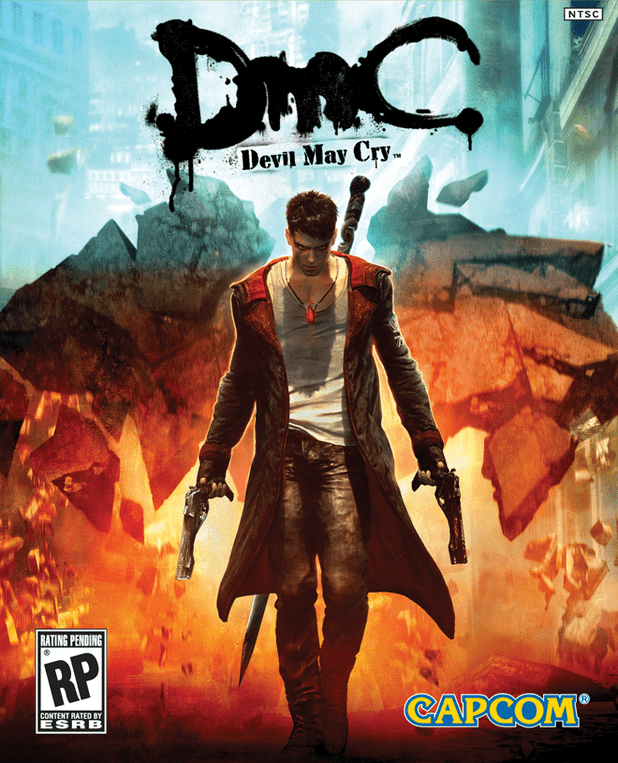Capcom took a pretty bold chance when they handed off one of their beloved franchises to British developers Ninja Theory. The Devil May Cry series was one of the most uniquely Japanese and hyper kinetic 3rd person action games of the previous generation. With the transfer of the property to Ninja Theory, there was a lot of controversy, and even death threats directed at studio head Tameem Antoniades, for the suite of dramatic changes they were taking towards the franchise. Of course, all of this was done with Capcom’s blessing in an attempt to reboot a hardcore action franchise for a new generation not-so-hardcore players. The end result is something interesting and enjoyable, but not the tightest, fastest action game around. Platinum—and Bayonetta in particular—have nothing to worry about.
A DMC Firmly In The Spirit Of The Teens
Alex Garland—most recently of Dredd fame—has crafted a story for the character of Dante that puts him firmly in the zeitgeist. A demon that rules the world through massive national debt, news outlets under the control of a demonic Bill O’Reilly, and Anonymous taking to the airwaves to stand against the demonic 1 per cent. It’s like Garland and Ninja Theory took every single timely subject and stuck them in this plot to make sure it was “hip enough” for the kids. Dante is a surly, emo punk who spends most of his time fighting demons and having a lot of casual sex. Then he meets up with his long lost brother Vergil and finds out their parents were killed by a demon named Mundus, who currently controls the world through a mixture of finance, politics and media control. With a new, sudden burning desire for revenge, Dante sets himself up to take Mundus down.
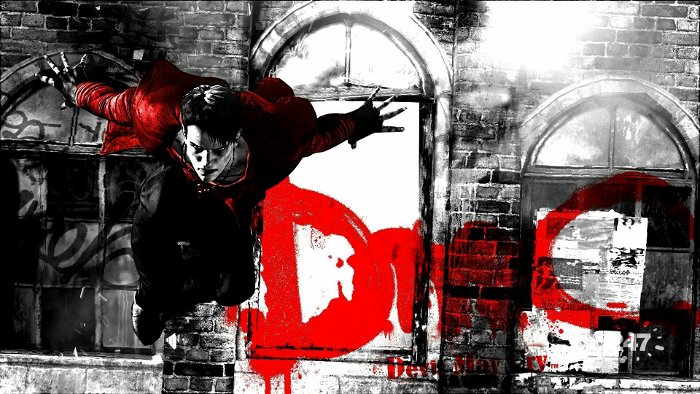
Aside from the fact that DmC will immediately date itself in a few years, it’s clear that the story is the real star of the show here. This is not the comedic, cocky Dante of the original Japanese series that found himself in situations as ludicrous as they were dangerous. This is a deeply troubled Dante, with a dark personality and some real weight to him. Perhaps the best way to view this new reboot is as an “Elseworlds” or Marvel “What If” story. Purists are going to hate this new take with livid rage, it bears little to no resemblance to the Dante older players remember. On the other hand, for people that want a bit more depth to their characters, this Dante and the journey he undertakes, has more substance and complexity to it. Dante and Vergil are more fleshed out here in ways they never were in previous series. In that sense, Capcom has succeeded in trusting this property to Ninja Theory because this really is a Dante that’s more relevant to a younger, more demanding audience.
Moving over to the visuals, we are presented with another Unreal engine game, but Ninja Theory has worked the engine over considerably. Rarely does Unreal’s characteristic texture load-in rear its ugly head, and the frame rate stays stable through gameplay, though it noticeably stutters during some of the more resource intensive real time cut scenes. The art direction is quite distinct, with a bold array of colours and some monster designs that feel like call backs to the old DMC’s piecemeal/clockwork assembled enemies. It’s definitely a good looking game, with decent performance stability.
On the audio side, Ninja Theory has added Noisia and Beatport Band to the soundtrack, so if you’ve got a subwoofer attached to your TV, you’re definitely going to be feeling a lot of bass. The acting and delivery of dialogue is definitely a step up from the usual DMC fare, although even the new Dante can’t resist the occasional awful, 80s action hero one liner after disposing of some enemies. The game sounds good, and even though it doesn’t necessarily have the same kind of audio immersion as an FPS, the music and weighty sound of the combat all contribute a polished audio experience.
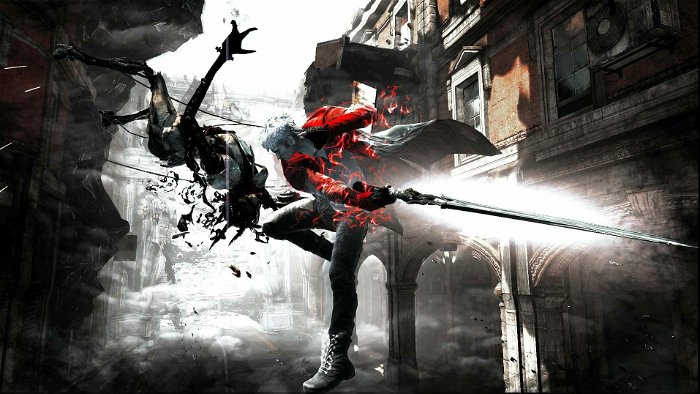
The Call Of Duty Of DMC Games
In a nutshell, if you’re new to the DMC franchise, you will probably love this game. If you’re a veteran of the series, you will find this dumbed down.
This is still a third person action game that relies on combos and rates your fights based on the variety of styles you employ. But both the combat engine itself has been slowed down to make executing combos easier, and the rating system has been made much more forgiving. Getting an “S Rank” for combat rounds is surprisingly easy, and the generous checkpoint system makes the use of the traditional DMC “Gold Idol” redundant, since continuing usually places you not far back from where you died.
For fans of the original series, a lot of nods to the combat are there. The sword is still called Rebellion, the pistols are still called Ebony & Ivory, and even combos like Stinger still have the same name as before. What’s changed dramatically is the timing of the combos. DmC is about spectacular looking combat and as a result, they’ve become more generous with the input timing, and even slowed down the animation somewhat so you can really appreciate how bad ass these moves look.
Obviously, for purists, this is horrifying. But for people new to the franchise, particularly those used to the power fantasies of Western titles like Call of Duty, the game is quite compelling. The COD mentality has its appeal because it’s empowering; players feel cool and untouchable when they play COD because the game wants you to feel like a killing machine. The original DMC only did that at the highest levels of player skill, a tradition carried on this generation by Bayonetta which is still one of the best action games of this generation even if it doesn’t come anywhere near as close as the new DMC to providing a bad ass power fantasy. This is a Westernized version of a Japanese game for everyone who says that Japanese games are too hard and therefore no fun.
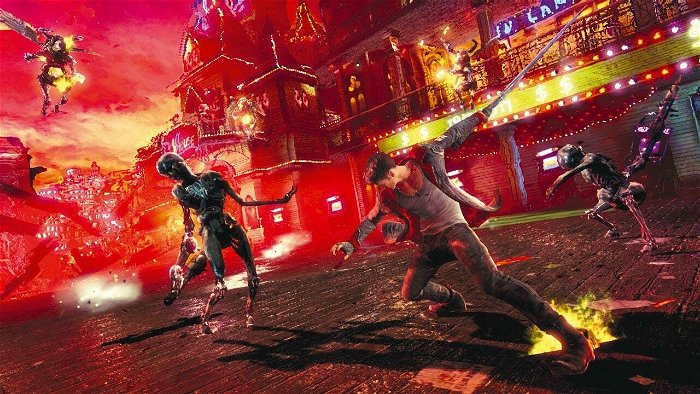
There is also more of a traversal aspect to the game that wasn’t as prominent in past titles. Thanks to a suite of angelic and demonic weapons, Dante can now grapple objects to pull them towards him, or pull himself toward the target. It creates new options of aerial combos and plays an important part in the grapple/platform segments that bear a strong resemblance to God of War. The traversal elements feels fast and actually requires a certain amount of coordination at times, though occasionally it feels like these levels go on a bit long to pad out the six to eight hour duration of the game. There are also secret missions to find, for bonus items and increasing your rating per level. And once the game is completed the traditional amped up DMC difficulty levels—like Dante Must Die mode—are unlocked.
So in the end, what are we left with? We have a bold new take on DMC that focuses more on the new—and interesting—lore than the traditional frenetic gameplay that the series is known for amongst hardcore gamers. Ninja Theory has made DMC accessible with a more considered rendering of the character and his world, and they’ve made the game more accessible for those who might not be able to pull off strings of precisely timed combos. Is this game worth your $60? If you’re a purist who wants only the kind of tight, demanding combat of the old series, then no.
If you’ve got an open mind and actually enjoy a more accessible game with an interesting story and some great acting, then yes. For the hardcore, this is not the game you’ve been waiting for, but it’s likely that Metal Gear Rising: Revengeance is, since Platinum has taken the combat the engine they’re famed for from Bayonetta and Vanquish and given it to Raiden of the MGS universe. Personally, I found the trade-off that Ninja Theory made to be an interesting one, and while I’m not completely sold on the easier gameplay, I appreciate the weight and depth they’ve added to Dante’s usually fluffy, ludicrous universe.
